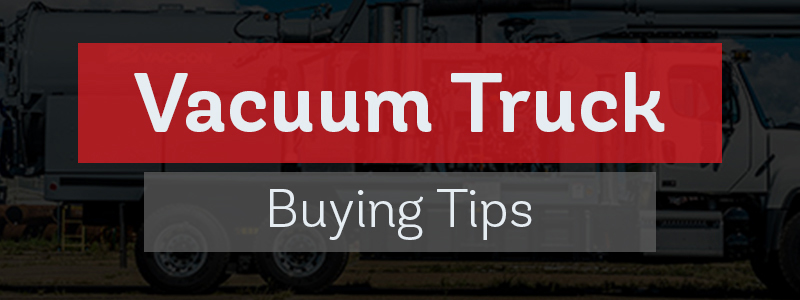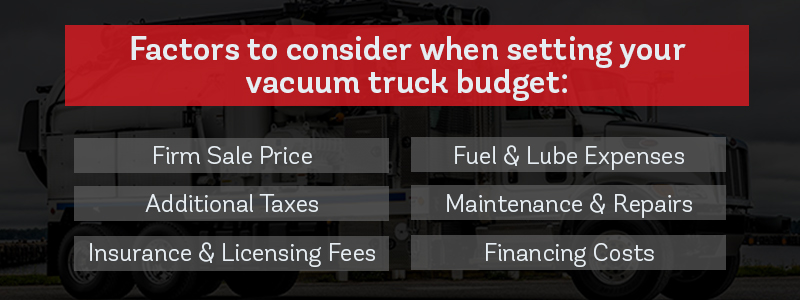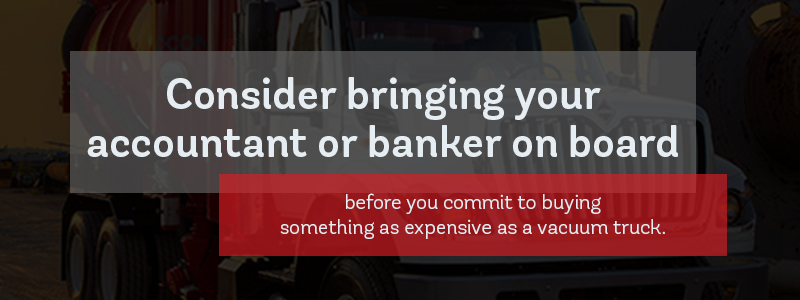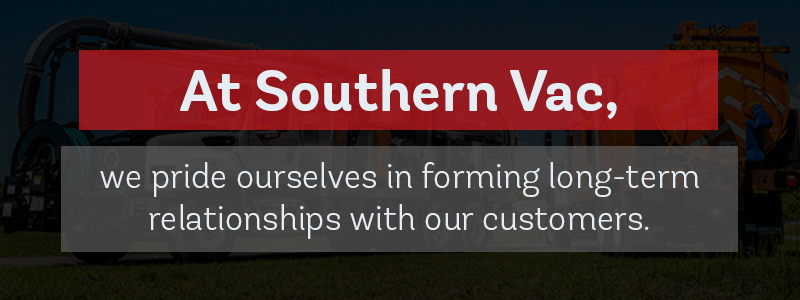
Acquiring a vacuum truck is a major purchase. It’s not a quick or impulsive decision. Vacuum trucks are large, sophisticated pieces of industrial equipment specially designed for specific needs. Whether you’re the purchasing agent for a large municipal fleet that includes wet, dry and combination vacuum trucks, or a small business operator looking to make a significant investment, you’ll want to do your due diligence before committing to a vacuum truck purchase.
There are many types of vacuum trucks on the national market, just as there are numerous service applications. The most common tasks for vacuum trucks are civic works like cleaning catch basins, storm drains and sanitation sewer lines. Large industrial vacuum trucks take on the big jobs in mines and oil fields.
No matter what industry you’re in, the primary consideration in acquiring a vacuum truck is what you’ll be using it for. Other factors stem from your intended purpose. That includes the exact type of machine, like having solely a wet suction capability, a dry blower unit or a combination of wet and dry abilities. You might want a multi-purpose vehicle that has hydro-excavating attachments or adjustable flows and pressures. Or you might be looking for a small, owner-operator truck for suctioning septic tanks in topographically challenging rural areas.
Second only to your needs is your budget. If you’re a municipal manager with large funding capabilities, you’ll certainly be better equipped to make the decision on buying a brand-new vacuum truck, as opposed to a one-person show with tight funds. New equipment has its advantages, but buyers on a short string have excellent options in buying good used and reconditioned machinery. You might be right in the middle and know your needs, but require help on financing your investment.
New machinery is great to operate, but it comes with a price. But unless you know a machine’s history, and it’s offered by a reputable dealer, used trucks might have hidden traps that’ll cost you dearly as well. It’s a tough choice between new and used. Perhaps you’re better off to consider renting or leasing a vacuum truck. This may be the best option if your needs are limited or seasonally driven. Regardless of your situation, do your research to decide what vacuum truck is best for you.
Know Your Needs
Moving forward, you should make every decision with your end needs in mind. You may already know exactly what type of vehicle you’re in the market for. A clear vision is immensely helpful in navigating obstacles that line the shopping path. It’s not so easy when you’re unsure what jobs you might be awarded, or what unexpected tasks may be asked.
Here’s where it really pays off to contact a reputable vacuum truck dealer and have an open, frank discussion about what parameters you’ll be operating in and what curve balls you might be thrown. A seasoned sales and service representative will have the experience and knowledge to quickly narrow your focus so you’ll be able to spend the time and energy in finding the exact vacuum truck that meets your needs.
Some of the needs your sales agent will discuss are:
- The exact jobs you’ll be doing. This might be narrowly specific or broadly applicable, depending on your industry. There’s no one-size-fits-all concept in the vacuum truck business. Just as not all trucks are designed the same, every manufacturer is different. Some specialize in large industrial work. Others build to smaller niche markets. But one thing all manufacturers have in common is they take their intended customer needs into consideration.
- The fleet you’re involved with. In a larger civic inventory, you may be looking for a very specific or perhaps even a custom-designed vehicle. In a small business trying to serve a wide market, you could be searching for a multi-purpose vacuum truck that can take on almost every job. A good service representative will quickly isolate your needs and set you in the right direction.
- The area you service. What geographical area you’re operating in has a marked impact on your truck needs. Dense city work can limit the size of your vacuum truck to a maximum height and wheel base so it can navigate side streets and alleys. Open rural work might limit your gross vehicle weight due to scale restrictions and road surfaces. Off-road conditions may require multi-wheel drives, while long-distance highway travel needs high speed. Make sure you take stock of the entire geographic operating sphere. It’s bound to help frame your needs.
- The climate zone you operate in. Vacuum trucks are highly responsive to climate conditions. If you’re in a hot Southern zone with 100-degree days, you’ll want to make sure your truck is capable of proper cooling. That includes an air-conditioned cab. Northern Central zones will hand you sub-zero working temperatures. Here, you need cold-weather capability and a heater in your truck.
- The amount of time you’ll be working in your truck. Full-time work requires top-condition equipment. A breakdown may cause expensive job interruption and high impact to other parties. Part-time work is more lenient, and you may only need an older vehicle that’s toward the end of its lifespan, but still serviceable for intermittent needs. Performance is a major consideration when buying a vacuum truck.
Consider Your Budget
At some point, every budget has a limit. Fitting your needs within a limited budget can be a challenge, but you have to be realistic to get the best vacuum truck you can afford. Your sales and service representative will be a big help in accurately determining what truck fits within your working budget.
The agreed-upon sales price is not the only factor in setting your budget. There are many other factors to build into the equation. There are also two budgetary approaches. One is to determine the type of vacuum truck you need, then make financing arrangements to pay for it. The second is to know the limits of your budget, and try to select a truck that fits your financial means. You could say it’s either a vehicle-driven or money-driven approach.
Some factors to consider when setting your overall vacuum truck budget are:
- The firm sale price. This includes the truck, plus all the accessories and customization you’d like. Make sure you’ve considered all the options available, and don’t get caught up in add-ons that will hike up the final sales price. A good representative won’t try to nickel-and-dime you.
- Additional taxes. Industrial machinery purchases are subject to federal, state and local taxes just like any other commodity. This includes used, reconditioned and rental vehicles. It’s rare you’ll be offered a tax-included deal, so make sure this expensive addition is covered in your working budget.
- The insurance and licensing fees. This can be very expensive, especially for a smaller operation without a fleet discount. Make sure you’ve allowed for adequate insurance coverage, registration fees and all levels of permitting. Also, be aware of pending inspections and mandatory remedial actions, which can be costly.
- Fuel and lubricant expenses. Diesel fuel and engine oil fluctuate in price, but they’re essential for your truck to make money on the job site. Don’t forget to budget for other liquids as well, like coolant, hydraulic fluid and miscellaneous lubricants. Do your diligence and determine the estimates of fuel and lubricant consumptions.
- Maintenance and repairs. New machinery is less likely to require immediate repairs, but it’s still going to require regular oil and filter changes, as well as inspections and the inevitable component tightening. Used vehicles are more of a gamble, but you can still estimate maintenance and repair costs. With rental or lease units, these costs will likely be built into the agreement.
- Financing costs. Very few companies purchase vacuum trucks without some sort of financial assistance. Financing is a cost of doing business, and a way of life in the heavy equipment world. Even large corporations and government operations with massive fleets find it advantageous to borrow purchase funds and leave operating capital open for other capacities. Financing can be an expensive part of your budget, but it can also be negotiable.
Figure Out Your Financing
You should know your financing capacity and requirements before seriously shopping for a vacuum truck. This isn’t a cart-and-horse situation, and there isn’t necessarily a right or a wrong way to approach financing. In fact, you can get quite creative with financing options, especially if you’re dealing with a sales professional who’s connected to a solid financial provider.
Consider bringing your accountant or banker on board before you commit to buying something as expensive as a vacuum truck. If you already know your needs and are comfortable that you’ve figured an accurate budget, you’ll be confident to move ahead and discuss financing so you’ll know what truck fits your overall framework.
Some of the financing factors to consider are:
- The finance-to-capital-investment ratio. This is a double-edged sword. On one side, the more capital you invest up front in your vacuum truck, the less you’ll borrow and the less interest you’ll pay. On the other side, the more you borrow the more working capital you’ll have free to use on other important business expenses like fuel, maintenance and payroll. Outside advice is helpful in determining your proper financial ratio.
- The interest rate. This can vary widely among lenders, and is somewhat controlled by the national bank rates. It also varies with the length of borrowing term and the schedule of repayment. And it certainly varies depending on the lending institution — not all banks specialize in equipment financing.
- The tax benefits. Tax breaks are one of the real advantages to purchasing equipment, as well as in financing something like a vacuum truck. Federal tax laws let you deduct at least part of the purchasing price of qualifying equipment. There are also deductions for depreciation and financing costs. Making a vacuum truck an owned company asset is a good investment, but as in all tax decisions, it’s best to consult an expert.
- The credit score impact. Your financing history and credit score have a huge impact on your ability to obtain financing and benefit from attractive interest rates. The more you finance equipment, the better credit rating you’ll build up and use to your benefit. Even if you finance only a small part of your vacuum truck purchase, you’ll benefit from your reputation. That includes relationships with sales outlets and financial providers.
- The relationship benefit. Trust and great working relationships with lenders and dealers have deep-reaching benefits. You’ll have them working for their interests, as well as your own. They’ll strive to source the best equipment and turn it into the best deal as long as they’re sure you’re sound and reliable. It’s impossible to put a price on working relationships.
Deciding Between New or Used
You know your needs, you’ve considered your budget and you’ve figured out the amount of financing necessary to buy your vacuum truck. Hopefully, you’ve also partnered with a reputable sales and service company that specializes in vacuum trucks. Now you’re ready to narrow down the exact piece of equipment that fits right in. There’s one more area to consider, and that’s whether you’re better off buying a new or used vacuum truck.
Some of the deciding factors in buying new or used are:
- Reliability. New equipment has a reputation for being more reliable than used machines. Generally, this is true, but new models can be lemons, and used or reconditioned vacuum trucks can be completely reliable. The key is knowing the individual truck and being confident in the dealer.
- Warranties. All new vacuum trucks come with a warranty package. How comprehensive the terms are depends on the truck’s manufacturer, and this is something a good sales outlet will be knowledgeable about and inform you. Leading dealers often have in-house warranties that include coverage on used equipment as well.
- Cost vs. return. You can expect a used or reconditioned vacuum truck to cost less than a new truck, but you really have to consider the return. That includes overall service life, fuel and maintenance costs, as well as reliability and operator safety. Make sure to include your sales representative in weighing true value.
- Service and support. Like other relationships, it’s hard to put a price on the true value of a service and support relationship. This might be the best tip you can get when buying a vacuum truck. Finding the right dealer to support your purchase and being able to service your needs is invaluable, and should be at the top of your list when planning your search for a vacuum truck.
Southern Vac prides ourselves in forming long-term relationships with customers. Customer satisfaction drives our everyday activities and is at the core of our business. We offer superior equipment in vacuum trucks and other specialized machinery throughout the Southeast. We’re committed to excellence, and our manufacturers are the best in the business.
Southern Vac carries the largest inventory of new, used, reconditioned and rental vacuum trucks in the area, and we offer immediate delivery. We provide comprehensive warranties and inclusive service packages. Our service team goes above and beyond in taking care of you. We know your needs. We can fit your budget. We can even finance your vacuum truck. And, best of all, we’re here to help you make that tough choice between new and used.
Contact Southern Vac today for more information or to purchase a vacuum truck.




Testing Comment
[…] Buying a high-quality vacuum truck is only half the battle for any owner. The other half involves maintaining your truck at peak efficiency. This process means regular maintenance checks that depend on the day, the week, the month or even the year. Regular maintenance means a long life for your vacuum truck and durable, long-lasting components that avoid wear and tear and corrosion. […]